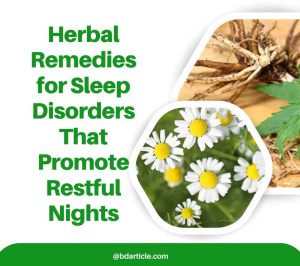Sleep is an essential pillar of health, yet millions of people struggle with sleep disorders that disrupt their quality of life. While prescription medications are a common solution, they often come with side effects and the risk of dependency. As a result, many individuals are turning to herbal remedies as a natural and effective way to promote restful sleep.

Exploring the most effective herbs, how they work, and tips for incorporating them into your nightly routine. With a holistic approach to wellness, these remedies can help you achieve the peaceful nights you deserve.
Understanding Sleep Disorders and Their Impact
Sleep disorders range from insomnia and sleep apnea to restless leg syndrome and narcolepsy. These conditions interfere with the body’s ability to maintain regular sleep patterns, leading to fatigue, poor concentration, and even long-term health complications like heart disease and anxiety.
Herbal remedies offer a gentle, noninvasive approach to addressing sleep disorders. They target the root causes of sleep disturbances, such as stress, hormonal imbalances, and inflammation.
The Science Behind Herbal Remedies for Sleep
Herbal remedies work by interacting with the body’s natural processes. Many herbs contain compounds that affect neurotransmitters like serotonin and GABA, which regulate mood and relaxation. Unlike synthetic drugs, herbal remedies often have fewer side effects, making them a preferred choice for those seeking long-term solutions.
Top Herbal Remedies for Sleep Disorders
-
Valerian Root
Valerian root is one of the most well-researched herbs for sleep. It contains valeric acid, which has sedative properties and helps increase GABA levels in the brain. Studies show that valerian root can reduce the time it takes to fall asleep and improve sleep quality.
How to Use:
- Take valerian root as a tea or supplement 30 minutes before bedtime.
- Avoid long-term use to prevent tolerance.
-
Chamomile
Chamomile is renowned for its calming effects and is a popular choice for managing insomnia. Its active compound, apigenin, binds to GABA receptors, promoting relaxation.
How to Use:
- Drink chamomile tea in the evening to unwind.
- Combine with honey for added benefits. LavendeLavender’sssoothing aroma is a natural stress reliever and sleep aid. Inhaling lavender oil or using it in a diffuser can significantly enhance sleep quality.
How to Use:
- Add a few drops of lavender oil to your pillow or diffuser.
- Use lavender sachets under your pillow for a subtle fragrance.
-
Passionflower
Passionflower is effective for reducing anxiety and promoting sleep. It boosts GABA levels, helping the brain relax and prepare for rest.
How to Use:
- Brew passionflower tea an hour before bedtime.
- Use passionflower supplements as directed.
-
Ashwagandha
Ashwagandha is an adaptogen that helps the body manage stress. It regulates cortisol levels, a stress hormone that can interfere with sleep.
How to Use:
- Take ashwagandha capsules or powder daily to build resilience against stress.
- Combine it with warm milk or water for better absorption.
-
Lemon Balm
Lemon balm is a mild sedative and mood enhancer that combats insomnia caused by stress and anxiety.
How to Use:
- Prepare lemon balm tea and drink it before bed.
- Pair it with valerian root for enhanced effects.
Incorporating Herbal Remedies into Your Routine
To maximize the benefits of herbal remedies, consistency is key. Here are some tips for creating a nightly routine:
- Establish a Relaxing Environment
Dim the lights, reduce noise, and set a calming ambiance to signal your body thait’s’s time to wind down. - Use Herbal Teas
Enjoying a warm cup of herbal tea can become a comforting ritual that helps prepare your mind and body for sleep. - Practice Mindfulness Techniques
Combine herbal remedies with practices like meditation or deep breathing to enhance their effects. - Track Your Progress
Keep a sleep journal to note how different herbs affect your sleep quality. This can help you identify what works best for you.
Herbs and Their Synergies
Certain herbs can be combined to amplify their effects, creating powerful remedies for sleep disorders. For example, pairing valerian root with lemon balm can boost relaxation, while chamomile and lavender work harmoniously to reduce stress and promote rest.
Safety and Precautions with Herbal Remedies
While herbal remedies are generally safe, it is essential to use them responsibly:
- Consult a Healthcare Professional: Before starting any herbal treatment, especially if you’re pregnant, breastfeeding, or taking medication.
- Follow Recommended Dosages: Overuse of herbs can lead to unwanted side effects.
- Monitor Allergies: Test for any allergic reactions before regular use.
Lifestyle Changes to Support Herbal Remedies
Herbs work best when combined with healthy sleep habits. Consider the following lifestyle changes:
- Stick to a Sleep Schedule
Go to bed and wake up at the same time each day, even on weekends. - Limit Screen Time
Reduce exposure to blue light from phones and computers an hour before bed. - Exercise Regularly
Physical activity promotes better sleep, but avoid intense workouts close to bedtime. - Avoid Stimulants
Limit caffeine and nicotine intake, especially in the evening. - Stay Mindful of Your Diet
Heavy meals or excessive sugar before bedtime can disrupt sleep.
Herbal Remedies for Specific Sleep Disorders
Certain herbs are particularly effective for addressing specific sleep issues:
- Insomnia: Valerian root and chamomile.
- Stress-Induced Sleep Problems: Ashwagandha and lemon balm.
- Restless Leg Syndrome: Magnesium-rich herbs like passionflower.
- Circadian Rhythm Disorders: Adaptogens like ashwagandha.
Modern Research and Herbal Remedies
Scientific research continues to validate the efficacy of herbal remedies for sleep. Studies show that these natural solutions can rival pharmaceutical interventions, particularly for mild to moderate sleep disturbances.
Interestingly, advancements in technology, like quantum computing, are also exploring potential overlaps with health and wellness applications. Just as “Quantum Cryptography Applications Explored for Modern Digital Security” can revolutionize cybersecurity, the combination of traditional knowledge with modern science is transforming how we view and use herbal remedies.
The Future of Herbal Sleep Aids
As awareness of natural health alternatives grows, the demand for herbal remedies is likely to increase. Innovations in supplement formulations and delivery methods, such as sleep patches or fast-absorbing liquids, are already making herbal remedies more accessible.
Final Thoughts
Herbal remedies for sleep disorders offer a natural, effective, and sustainable way to improve sleep quality. By incorporating these time-tested solutions into your nightly routine, you can tackle sleep disturbances without the side effects of traditional medications. Whether you’re battling chronic insomnia or simply looking for a way to relax after a long day, herbs like valerian root, chamomile, and lavender can be your trusted allies. Combine them with mindful lifestyle changes, and you’ll be well on your way to achieving restful, rejuvenating sleep every night.
Herbal_Remedies_For_Leep_Disorders #Sleep_Disorders Natural_Sleep_Remedies

